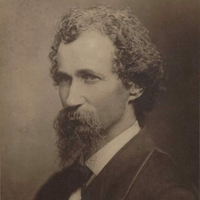On a Street
I dread that street - its haggard face
I have not seen for eight long years;
A mother’s curse is on the place,
(There’s blood, my reader, in her tears).
No child of man shall ever track,
Through filthy dust, the singer’s feet -
A fierce old memory drags me back;
I hate its name - I dread that street.
Upon the lap of green, sweet lands,
Whose months are like your English Mays,
I try to hide in Lethe’s sands
The bitter, old Bohemian days.
But sorrow speaks in singing leaf,
And trouble talketh in the tide;
The skirts of a stupendous grief
Are trailing ever at my side.
I will not say who suffered there,
’Tis best the name aloof to keep,
Because the world is very fair -
Its light should sing the dark to sleep.
But, let me whisper, in that street
A woman, faint through want of bread,
Has often pawned the quilt and sheet
And wept upon a barren bed.
How gladly would I change my theme,
Or cease the song and steal away,
But on the hill and by the stream
A ghost is with me night and day!
A dreadful darkness, full of wild,
Chaotic visions, comes to me:
I seem to hear a dying child,
Its mother’s face I seem to see.
Here, surely, on this bank of bloom,
My verse with shine would ever flow;
But ah! it comes - the rented room,
With man and wife who suffered so!
From flower and leaf there is no hint -
I only see a sharp distress -
A lady in a faded print,
A careworn writer for the press.
I only hear the brutal curse
Of landlord clamouring for his pay;
And yonder is the pauper’s hearse
That comes to take a child away.
Apart, and with the half-grey head
Of sudden age, again I see
The father writing by the dead
To earn the undertaker’s fee.
No tear at all is asked for him -
A drunkard well deserves his life;
But voice will quiver, eyes grow dim,
For her, the patient, pure young wife,
The gentle girl of better days,
As timid as a mountain fawn,
Who used to choose untrodden ways,
And place at night her rags in pawn.
She could not face the lighted square,
Or show the street her poor, thin dress;
In one close chamber, bleak and bare,
She hid her burden of distress.
Her happy schoolmates used to drive,
On gaudy wheels, the town about;
The meat that keeps a dog alive
She often had to go without.
I tell you, this is not a tale
Conceived by me, but bitter truth;
Bohemia knows it, pinched and pale,
Beside the pyre of burnt-out youth:
These eyes of mine have often seen
The sweet girl-wife, in winters rude,
Steal out at night, through courts unclean,
To hunt about for chips of wood.
Have I no word at all for him
Who used down fetid lanes to slink,
And squat in tap-room corners grim,
And drown his thoughts in dregs of drink?
This much I’ll say, that when the flame
Of reason reassumed its force,
The hell the Christian fears to name,
Was heaven to his fierce remorse.
Just think of him - beneath the ban,
And steeped in sorrow to the neck,
Without a friend - a feeble man,
In failing health - a human wreck.
With all his sense and scholarship,
How could he face his fading wife?
The devil never lifted whip
With thongs like those that scourged his life.
But He in whom the dying thief
Upon the Cross did place his trust,
Forgets the sin and feels the grief,
And lifts the sufferer from the dust.
And now, because I have a dream,
The man and woman found the light;
A glory burns upon the stream,
With gold and green the woods are bright.
But still I hate that haggard street,
Its filthy courts, its alleys wild;
In dreams of it I always meet
The phantom of a wailing child.
The name of it begets distress -
Ah, song, be silent! show no more
The lady in the perished dress,
The scholar on the tap-room floor.

